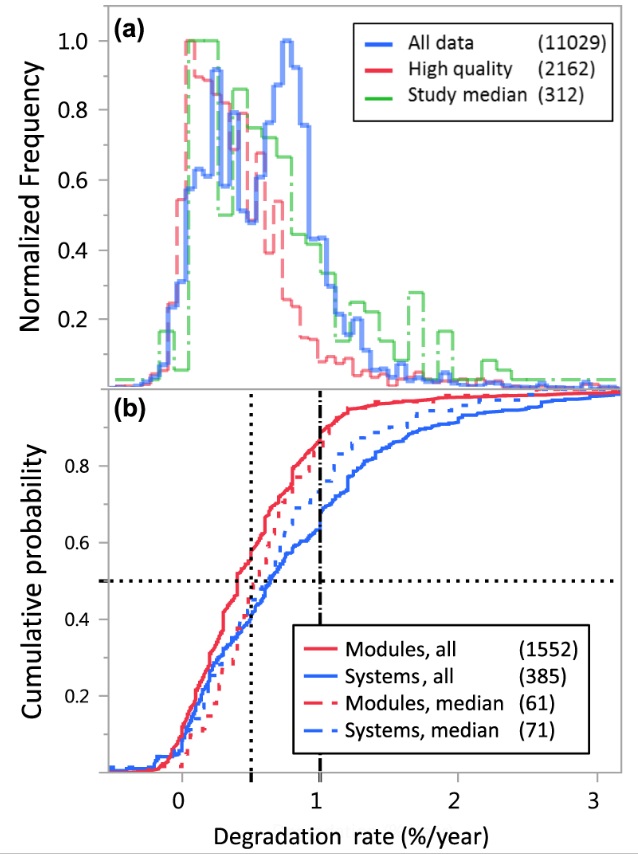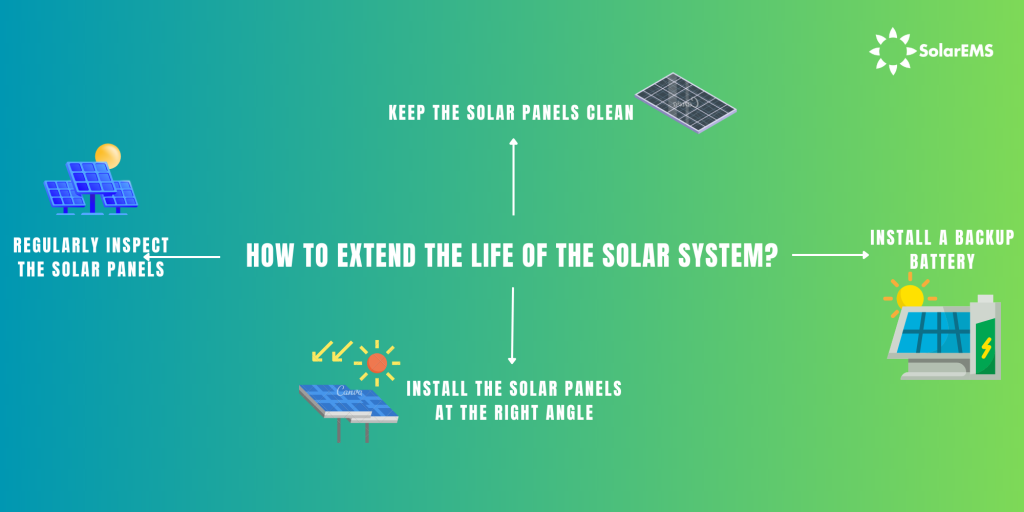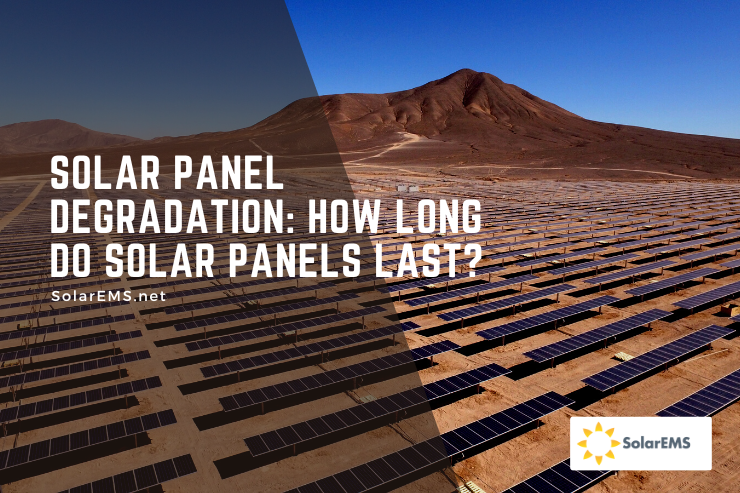The function of a solar panel is to apprehend the sunlight or sun rays and transform them into useful energy. These panels are manufactured using photovoltaic cells which can help generate electricity while utilizing the principle of the photovoltaic effect.
Solar panels have proven to be particularly effective solutions for problems in a time when energy bills are exponentially increasing and fossil fuels rapidly depleting. As people are looking for ways to reduce their electricity bills while taking care of the environment, you can install solar at your residence, farm, business place, or any other place where you need electricity to function.
However, before installing solar panels you also need to know about solar panel degradation so that you can evaluate your finances before undertaking this long-term solution for your electricity bills. In this article, we will discuss how long a solar panel lasts and what you can do to improve its longevity.
What is the general lifespan of solar panels?
Before installing a solar system you need to be aware of the general lifespan of the solar panels. Generally, after the installation of solar panels, you can expect them to last for at least 25 to 30 years. However, if maintained properly you can expect greater longevity from the system. However, 25 to 30 years can be considered the minimum threshold for the lifespan of solar panels.
For example, solar panels that people installed in the 80s are still functional to this day, and with the advancement of technology, their lives have only increased. You also need to understand that if your solar panel is guaranteed to function for 27 years, it does not mean that it will necessarily cease functioning after 27 years have passed after the installation. In fact, it only implies that the energy output of your solar panels will drop after a certain period of time.
What do we mean by solar panel degradation?

If you are searching about solar panel lifespan on the internet then you must have come across the term ‘solar panel degradation’. The term solar panel degradation suggests that the functionality or output of a solar panel decreases over time.
Just like any other equipment, solar panels become unable to offer their 100% after their guaranteed operating period. So, after 30 to 35 years, most solar panels tend to lose their effective functionality. The more time passes after installation, solar panels start to age and their output rate gradually decreases. This is due to the wear and tear of the photovoltaic cells used to manufacture the solar panels.
However, you need to note that if the solar panel degradation rate of your installed system is low then it will be able to produce more electricity. This means that the lower the degradation rate of the solar panels, the better performance they can provide. Therefore, the quality of materials used, the brand of the product, etc. matters a lot when it comes to installing solar panels.
The reason behind solar panel degradation
By now we have established that due to solar panel degradation, the output or energy produced by the solar panels decreases over time. This is despite the panels receiving the same amount of exposure to the sunlight thus ultimately resulting in the reduction of solar power efficiency. However, there are lots of external factors involved in the process of solar panel degradation such as damages due to the change in weather, and more.
Another prominent factor that reduces the efficiency of solar panels is the miniature cracks on silicons attached to the solar panels. Due to these miniature cracks or fractures, the electrical connectivity in the solar panels reduces their capacity to carry electrons. This means that your inverter will be receiving less electricity to power up your residence, farm, office, etc.
The natural causes of solar panel degradation include exposure to UV or ultraviolet rays, moist heat, etc. The insulating substances of the solar panels are also affected by prolonged contact with elevated humidity at extreme temperatures. UV rays have the ability to degenerate and smear the back sheet of the solar panels and the humidity freeze damages the adhesion of the junction box.
Importance of degradation rate while selecting solar panels
As mentioned earlier, the general life expectancy of solar panels is around 25 to 30 years after which they cannot perform at their full potential. The solar panel degradation rate is the term that suggests the speed at which the solar panels start losing their functionality, producing less amount of energy.
Most solar products currently available on the market degrade at about 0.5% each year. While installing solar panels you need to remember that even a little bit of a decrease in the energy production of the solar panels can have a significant impact on your energy savings. For the same reason, it is extremely important to thoroughly check the solar panel degradation rate before you end up purchasing and installing solar panels of a particular brand.
How to extend the life of the solar system?

Here is a list of suggestions you can follow to increase the life expectancy of your solar panels:
Keep the solar panels clean
If you regularly clean the solar panels then you can significantly reduce the rate of solar panel degradation.
Install a backup battery
Using a backup battery can significantly reduce the burden on your solar panels which in turn will lessen the solar panel degradation. Also with the help of the same, you will be able to charge various devices at the same time.
Install the solar panels at the right angle
While installing the solar panels it is important to place them at the correct angles. This will ensure that you are receiving the benefits of a solar system efficiently while protecting your solar panels from solar panel degradation. Select the angle that can provide the best sunlight exposure while keeping your solar panels safe.
Regularly inspect the solar panels
You need to regularly inspect the solar panels in order to find out the flaws and issues in the solar panels. If you come across any minor issue then you can immediately repair the same to avoid huge losses in the long run. While you are inspecting the solar panels be sure to thoroughly check the exposed wires, sagging racks, broken panels, and cracks. You should opt for the assistance of a professional to receive the best results.
What kind of solar panels have more longevity?
Among the factors that decide the solar panel degradation rate, product quality is the most important one. Depending on the product quality, the currently available solar panels in the market can be divided into three separate categories. They are:
| Tier 1 Solar Panel Manufacturing | Tier 2 Solar Panel Manufacturing | Tier 3 Solar Panel Manufacturing |
|---|---|---|
| Most vertically integrated in the same facility | Less vertically integrated than Tier 1 | Least / not vertically integrated |
| Use the best-grade of semiconductor | Use moderate-grade of semiconductor | Uses a moderate grade of semiconductor |
| Advanced robotic process in manufacturing (fully automated) | Partial robotic process manufacturing process | Partial to absolutely no robotic process manufacturing involved |
| Most expensive | Moderately expensive | Least expensive |
| Best quality | Moderate quality | Lowest quality |
The manufacturers of tier-one solar panels have been present in this industry for more than five years and they offer excellent services along with quality products. More importantly, tier one solar panels can offer relatively higher performance even after 25 years of usage in comparison to tier two and tier three solar panels.
The degradation rate for tier one solar panels is 0.30%, for tier two solar panels it is 0.50% and for tier three solar panels it is 0.80%. A study from National Renewable Energy Laboratory or NREL suggests the average solar panel degradation across all solar panels is 0.50% which means even after using them for 25 years they will be able to provide around 89% to 90% of their original output.
Factors influencing the lifespan of solar panels
Some of the factors that determine how long your solar system will be able to generate electricity through solar panels include:
Quality of the solar panels
The overall quality of the solar panel has a significant impact on solar panel degradation. The better the quality of your solar panel, the lesser the rate of degradation. While purchasing solar panels you can look at the warranty period offered by the manufacturer of the solar panels. If the brand offers 25 years of warranty or more, selecting their products would be wise.
Installation procedure
While installing solar panels you should not only just focus on the quality of solar panels but also put equal emphasis on how it is being installed. If installed inappropriately, your solar panels can degrade at a much faster rate. You should get in touch with an experienced solar panel installer at the time of solar panel installation to get the maximum output, safety, and qualitative experience.
Regular maintenance
Apart from being environment-friendly, one of the biggest advantages of using solar panels is that they are low-maintenance products. As a result, you won’t have to give an extensive amount of time and effort to regularly inspect the solar panels. Just check them out once in a while and clean them to slow down the solar panel degradation rate.
For example, in lots of areas solar panels rack up debris on their surface. This debris not only blocks the sun rays but also can potentially damage them through scratching and chipping the panels. It is a good idea to routinely clean off the accumulated debris from the surface of your solar panels to increase their longevity.
Final words
According to industry standards, solar panels can last a minimum of 25 years but even after that, it does not expire. You can expect significant changes in its performance but it will continue to work well to help you save money and contribute to environmental conservation.
However, you also need to note that if the efficiency or productivity of the solar panel becomes less than 80%, then it is time for you to replace them with newer ones. Although these old solar panels are not completely useless, leaving them intact won’t be helpful for you in the long run.
Frequently Asked Questions
How long do solar panels degrade?
The solar panel degradation rate for high-quality solar panels is 0.5% every year. After functioning for 25 to 30 years it can work 12% to 15% less efficiently than its original output.
What happens when a solar panel degrades?
The result of solar panel degradation is reduced energy output. Depending on the manufacturer, quality of the materials, and technology used in the production process, solar panel degradation rates can differ. As part of the product performance warranty, solar panels are guaranteed against degradation rate.
Can a damaged solar panel still work?
Yes, a damaged or cracked solar panel retains its capacity to produce energy but the voltage will be much less than a flawless panel. You will be able to produce current using the damaged panels but it will not function with maximum efficiency.
How often do solar panels need to be cleaned?
The manufacturers recommend cleaning the solar panels once every six months to a year. By cleaning the panels you will be able to get rid of the dirt that sticks to the panels and as a result, it will increase the efficiency, potency, and functionality of the solar panels. However, if you stay in a region that is prone to more dust and pollution then you need to adjust the cleaning frequency accordingly.
What is the maintenance of solar panels?
The maintenance of solar panels includes regular inspections and cleaning of the panels. You can do it at least once every six months or a year depending on the location of your residence. If your solar panels are functioning adequately then you won’t need any kind of additional maintenance.
In this article we have discussed the potential aspects of solar panel degradation, what are the factors involved, what can be done to prevent or slow down the solar panel degradation rate, and the importance of considering the solar panel degradation rate while installing or purchasing solar panels. Furthermore, we have also included the different qualities of solar panels available in the market along with their respective degradation rates so that users can make advantageous decisions.


